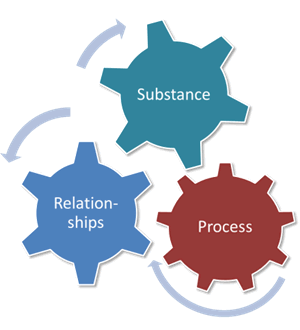As outlined in the graphic below, community engagement facilitators focus on three dimensions of interactions between people: content, relationships, and process.

The content is the substance of the community engagement issue being discussed. The content of the issue focuses on defining the problem, its causes, the relevant information on all sides of the issue, the 'technical' aspects of the issue, the relevant jurisdictions, regulations and authorities involved, the alternatives and consequences of the choices to be made and the decisions that will need to be made. Content is intrinsically part of your entire engagement effort including goals, meeting agendas, communications, and evaluation.
Relationships refer to fostering, at every opportunity possible, a solid foundation of trust, common understanding and vision, and inter-relationships with all those involved in the engagement process. While building relationships is the core of much of your facilitation and process, it is often also an important 'soft' skill that facilitators need to take into account. This involves ensuring all interests are respected and given due consideration, communication is effective and on-going (and often one on one), and group processes and conflict are managed effectively.
Process concerns are focused on how your engagement effort is structured to ensure you reach your goals and the logistical design of your overall engagement plan. Aspects of your process include the discussion methods, procedures, meeting format and tools being used during a meeting or discussion. Process also includes the style of the interaction (ex. group discussion, panel discussion and presentation), the group dynamics of participants and the climate established for the meeting. Facilitators pay attention to process to better ensure all participants contribute to the outcome of the meeting. The table provided below looks at the distinctions between content and process.
| Content (the What) | Process (the How) |
|---|---|
| Topics for discussion | Discussion methods and meeting procedures |
| Tasks to be accomplished | How relationships are maintained |
| Problems being addressed | Tool being used |
| Decisions being made | Ground rules and norms |
| Agenda items | Group dynamics |
| Goals | The climate |
Community engagement facilitators commonly have a deep understanding about the issue or problem around which they are facilitating. The facilitator will likely have an opinion about the decision or direction the group should take to address a problem. Effective facilitators use their understanding of the issue, meeting purpose and expected outcomes along with process skills and tools, to help the groups they are working with engage in effective dialogue, understand the information and decisions they are considering and develop plans for group action.
The facilitator is often seen as the meeting leader, and in fact does provide process leadership. However the facilitator should always stay neutral on content and actively manage process.

